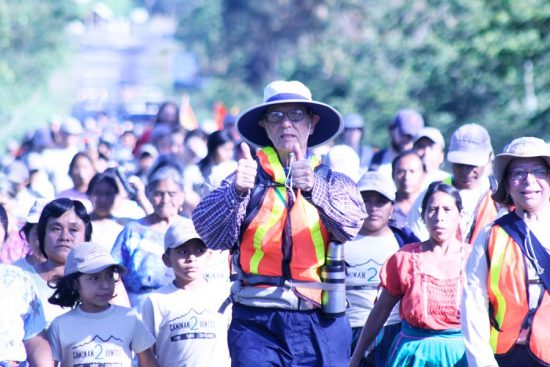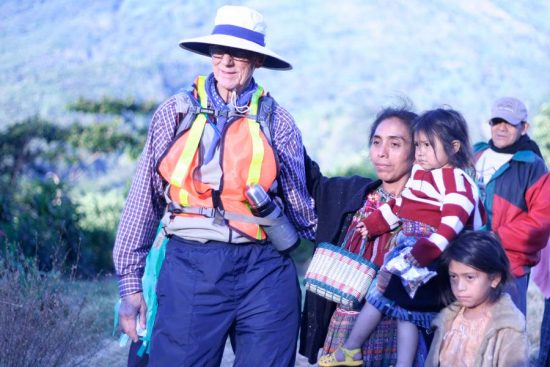 People are capable of more than they think they are.
People are capable of more than they think they are.
Our late co-founder Bob Hentzen shared that wisdom with me in a December 2009 interview at the start of his extraordinary walk from Guatemala to Chile, a trek that crossed 12 countries, 18 months and nearly 8,000 miles. He'd answered a question I asked him about parallels between the long haul of the walk and our work with families in poverty.
Bob had a good idea about what lay ahead on the walk, as he'd finished a 4,000-mile trek from our headquarters in Kansas City to Guatemala 13 years earlier. He began that first journey on March 29, 1996, his 60th birthday. He ended the second one on June 6, 2011, at the age of 75.
[Tweet "People are capable or more than they think they are. @Unbound founder's legacy lives on."]
 Bob Hentzen walks with families in Guatemala in 2009, at the start of his second marathon walk. His wife, Cristina (far right) walks with them.
Bob Hentzen walks with families in Guatemala in 2009, at the start of his second marathon walk. His wife, Cristina (far right) walks with them.
On both journeys, Bob walked in solidarity with the families in our program to let them know they were not alone, that our community of sponsors, staff and volunteers were with them to counterbalance the isolating effects of poverty. He also sought to raise awareness of the realities and capabilities of marginalized people.
Bob's confidence, despite the inherent risks, stemmed from his academic and physical training, his life experiences and his faith. He was meticulous in his preparations, taking every precaution to avoid blisters, dehydration, fatigue, traffic hazards and the dozens of other things that could have derailed him or posed a threat to the people walking with him. He also had a healthy respect for the unknown and what it took to face it.
"I had the privilege of going through some survival training," he said, "and one of the things they taught me was that, 'Bob, you are capable of much more than you think you are, physically and psychologically, so get over it. Get over it and keep walking."
That he'd had that experience before he and the other co-founders started Unbound was key.
"I'm just thinking that it was part of God's plan that I got that training when we had to make the decision to give up secure jobs and launch into the unknown," Bob said. "That, I think, is very providential and very parallel. Here [on the walk], we're launching into the unknown every day."
The parallels between the walk and Unbound's work with families, as Bob described them, were many. At one point in our interview, as I walked beside him, he noted the hundreds of families who had joined the walk that day, and said that providing personal attention for the families we serve is "of the essence."
He spotted a group of young people walking ahead of us that included a boy born with a physical disability that made it difficult for him to walk. Yet, "he is right here with us," Bob said.
"What I'm saying is that all of these kids and all of these parents have felt that we love them and we take them into account. We care about them and therefore, after 36 years of war in this country [a civil war in Guatemala that lasted from 1960-1996], this walk has become a rallying cry and a joyful sound that you heard with the firecrackers, and even very little kids up at 4 o'clock this morning and wanting to participate."
 Bob greets a mother and her children while taking a break from walking. The family is one of thousands he met on his trek from Guatemala to Chile.
Bob greets a mother and her children while taking a break from walking. The family is one of thousands he met on his trek from Guatemala to Chile.
There was a celebratory atmosphere on that first day of the walk, complete with music and fireworks, as throngs of people lined the streets to greet the walkers passing through their towns. Among them was a young mother holding her baby, standing in the doorway of her home in the pre-dawn hour. I asked Bob what about the walk resonated with families like hers.
"The poor read us very well," Bob said. "They know our true attitude toward them, when they find our sincere love, when they know we relate to them as an equal and not a superior, as an equal.
"But they also know we expect them to better their situation. We expect the dads to stay with their family, for example. We expect the fathers not to hit their wives or children. … We expect them to participate in the [Unbound] development programs, learning new things and taking the initiative the world needs if we're going to offer a better place for these children to grow up."
People are also looking for authenticity, Bob said.
"We told these people we were going to walk with them and here we are," he said. "They have been deceived so many times by politicians and by other situations in these countries that when they find something authentic, they really respond to it. And so do the sponsors."
He added later, "We are the group that not only walks, we are the group that really cares about and relates to the poor, as discomforting as that can be sometimes."
Bob passed away in 2013, but the lessons of his walks live on in the Unbound community. One of the main messages he hoped to get across was the tremendous potential of the people we serve.
"Society has told them all along that they are not capable," he said. "We are here to tell them that they are quite capable."
Help a child and family reach their potential. Sponsor today.
Copyright 2016 Loretta Shea Kline, managing editor at Unbound
About the Author

Unbound
Unbound is an international nonprofit founded by lay Catholics grounded in the Gospel call to put the needs of the marginalized and vulnerable first. We build relationships of mutual respect and support that bridge cultural, religious and economic divides. We bring people together to challenge poverty in Africa, Asia, and Latin America. We invite you to join us. Find us on Facebook, Instagram, and YouTube.


.png?width=1806&height=731&name=CatholicMom_hcfm_logo1_pos_871c_2728c%20(002).png)
Comments